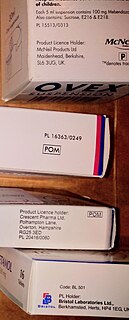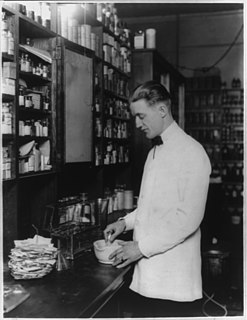Related Research Articles

Over-the-counter (OTC) drugs are medicines sold directly to a consumer without a requirement for a prescription from a healthcare professional, as opposed to prescription drugs, which may be supplied only to consumers possessing a valid prescription. In many countries, OTC drugs are selected by a regulatory agency to ensure that they contain ingredients that are safe and effective when used without a physician's care. OTC drugs are usually regulated according to their active pharmaceutical ingredient (API) rather than final products. By regulating APIs instead of specific drug formulations, governments allow manufacturers the freedom to formulate ingredients, or combinations of ingredients, into proprietary mixtures.

A prescription, often abbreviated ℞ or Rx, is a formal communication from a physician or other registered health-care professional to a pharmacist, authorizing them to dispense a specific prescription drug for a specific patient. Historically, it was a physician's instruction to an apothecary listing the materials to be compounded into a treatment—the symbol ℞ comes from the first word of a medieval prescription, Latin: Recipere, that gave the list of the materials to be compounded.

A prescription drug is a pharmaceutical drug that legally requires a medical prescription to be dispensed. In contrast, over-the-counter drugs can be obtained without a prescription. The reason for this difference in substance control is the potential scope of misuse, from drug abuse to practicing medicine without a license and without sufficient education. Different jurisdictions have different definitions of what constitutes a prescription drug.
Many countries have measures in place to limit advertising by pharmaceutical companies.
Drug diversion is a medical and legal concept involving the transfer of any legally prescribed controlled substance from the individual for whom it was prescribed to another person for any illicit use. The definition varies slightly among different jurisdictions, but the transfer of a controlled substance alone usually does not constitute a diversion, since certain controlled substances that are prescribed to a child are intended to be administered by an adult, as directed by a medical professional. The term comes from the "diverting" of the drugs from their original licit medical purpose. In some jurisdictions, drug diversion programs are available to first time offenders of diversion drug laws, which "divert" offenders from the criminal justice system to a program of education and rehabilitation.

Off-label use is the use of pharmaceutical drugs for an unapproved indication or in an unapproved age group, dosage, or route of administration. Both prescription drugs and over-the-counter drugs (OTCs) can be used in off-label ways, although most studies of off-label use focus on prescription drugs.
The United States Food and Drug Administration (FDA) Office of Criminal Investigations (OCI) was established to provide the FDA with a specific Office to conduct and coordinate criminal investigations.
An online pharmacy, internet pharmacy, or mail-order pharmacy is a pharmacy that operates over the Internet and sends orders to customers through mail, shipping companies, or online pharmacy web portal.

In the field of pharmacy, compounding is preparation of a custom formulation of a medication to fit a unique need of a patient that cannot be met with commercially available products. This may be done for medical reasons, such as administration in a different format, to avoid a non-active ingredient the patient is allergic to, or to provide an exact dose that isn't commercially available. Medically necessary compounding is referred to as "traditional" compounding. It may also be done for medically optional reasons, such as preference of flavor or texture, or dietary restrictions.
Direct-to-consumer advertising (DTCA) refers to the marketing and advertising of pharmaceutical products directly to consumers as patients, as opposed to specifically targeting health professionals. The term is synonymous primarily with the advertising of prescription medicines via mass media platforms—most commonly on television and in magazines, but also via online platforms.
In the United States, Medicare fraud is the claiming of Medicare health care reimbursement to which the claimant is not entitled. There are many different types of Medicare fraud, all of which have the same goal: to collect money from the Medicare program illegitimately.

A pharmacy is a retail shop which provides pharmaceutical drugs, among other products. At the pharmacy, a pharmacist oversees the fulfillment of medical prescriptions and is available to counsel patients about prescription and over-the-counter drugs or about healthcare and wellness issues. A typical pharmacy would be in the commercial area of a community. Mail-order dispensing is a recent development.
Electronic prescription is the computer-based electronic generation, transmission, and filling of a medical prescription, taking the place of paper and faxed prescriptions. E-prescribing allows a physician, physician assistant, pharmacist, or nurse practitioner to use digital prescription software to electronically transmit a new prescription or renewal authorization to a community or mail-order pharmacy. It outlines the ability to send error-free, accurate, and understandable prescriptions electronically from the healthcare provider to the pharmacy. E-prescribing is meant to reduce the risks associated with traditional prescription script writing. It is also one of the major reasons for the push for electronic medical records. By sharing medical prescription information, e-prescribing seeks to connect the patient's team of healthcare providers to facilitate knowledgeable decision making.
A counterfeit medication or a counterfeit drug is a medication or pharmaceutical item which is produced and sold with the intent to deceptively represent its origin, authenticity, or effectiveness. A counterfeit drug may contain inappropriate quantities of active ingredients, or none, may be improperly processed within the body, may contain ingredients that are not on the label, or may be supplied with inaccurate or fake packaging and labeling. Counterfeit drugs are related to pharma fraud. Drug manufacturers and distributors are increasingly investing in countermeasures, such as traceability and authentication technologies, to try to minimise the impact of counterfeit drugs. Antibiotics with insufficient quantities of an active ingredient add to the problem of antibiotic resistance.

A drug coupon is a coupon intended to help consumers save money on pharmaceutical drugs. They are offered by drug companies or distributed to consumers via doctors and pharmacists, and most can be obtained online. There are drug coupons for drugs from many categories such as cholesterol, acne, migraine, allergies, etc.
KwikMed is an approved online pharmacy in the United States which has been granted regulatory approval to operate and sell medications online. Based in Salt Lake City, Utah, KwikMed's parent company, Phoenix Capital Management, is located in Scottsdale, Arizona. Specifically, KwikMed has been granted regulatory approval to prescribe medications for erectile dysfunction, male pattern hair loss and smoking cessation provided specific operating procedures are followed.
Pharmaceutical fraud involves activities that result in false claims to insurers or programs such as Medicare in the United States or equivalent state programs for financial gain to a pharmaceutical company. There are several different schemes used to defraud the health care system which are particular to the pharmaceutical industry. These include: Good Manufacturing Practice (GMP) Violations, Off Label Marketing, Best Price Fraud, CME Fraud, Medicaid Price Reporting, and Manufactured Compound Drugs. Examples of fraud cases include the GlaxoSmithKline $3 billion settlement, Pfizer $2.3 billion settlement, and Merck $650 million settlement. Damages from fraud can be recovered by use of the False Claims Act, most commonly under the qui tam provisions which rewards an individual for being a "whistleblower", or relator (law).

The opioid epidemic is the extensive ongoing overuse of opioid medications, both from medical prescriptions and from illegal sources. The epidemic began in the United States in the late 1990s, according to the Centers for Disease Control and Prevention (CDC), when opioids were increasingly prescribed for pain management and resulted in a rise in overall opioid use throughout subsequent years. The great majority of Americans who use prescription opioids do not believe that they are misusing them.
SUPPORT for Patients and Communities Act, also known as Substance Use–Disorder Prevention that Promotes Opioid Recovery and Treatment for Patients and Communities Act, is a United States federal law, enacted during the 115th United States Congress, to make medical treatment for opioid addiction more widely available while also cracking down on illicit drugs. This piece of legislation is part of the ongoing conflict to stop and prevent the opioid epidemic in the United States. President Trump signed the bill on October 24, 2018.
When authorized medical personnel prescribe two or more medications together for the same condition or disease to the same patient, it is known as co-prescribing. When clinicians prescribe the opioid overdose drug naloxone to patients in conjunction with the patient's opioid prescriptions, or to patients at risk for opioid overdose, it is called a naloxone co-prescription. Due, in part, to the opioid epidemic in the United States, there are currently both a state-level and nation-wide movement in the medical and public policy fields to encourage, and sometimes require, naloxone co-prescribing. The U.S. government has issued guidelines recommending co-prescribing naloxone along with opioids. Some co-prescribing, e.g., the practice of co-prescribing benzodiazepines and certain opioid medications to patients, has been cause for concern due to the high risk of opioid overdose.
References
- ↑ Hileman, Bette. "COUNTERFEIT DRUGS: Sophisticated Technologies and Old-Fashioned Fraud Pose Risks to the Prescription Drug Supply in the U.S." Chemical & Engineering News Printed 10 November 2003. Accessed 15 February 2008.
- ↑ Beyerle, Dana. "Medicaid Drug Fraud Trial a Who’S Who of Lawyers Archived 25 July 2011 at archive.today ." TimesDaily.com Printed 9 February 2008. Accessed 15 Feb. 2008.
- ↑ Albany Oncologists To Repay Medicaid $1.2 Million
- ↑ Dixon, Kim (2 January 2008). "Free drug samples go to wealthy, insured: U.S. study". Reuters . Washington. Archived from the original on 9 September 2012. Retrieved 6 November 2010.
- ↑ Nordenberg, Tamar "Selling drug samples lands doctor in prison - Dr. Kumaralingam Nagalingam sentenced for Medicare fraud and selling free drug samples" FDA Consumer. Printed March–April, 1998. Retrieved 15 February 2008.
- ↑ Clifton Adcock (31 March 2007). "Former Doctor Charged in Drug Fraud". Tulsa World, Okla. redOrbit.
- ↑ "2007 Senate Bill 88 (Tighten rules against drug fraud) - KentuckyVotes.org". Archived from the original on 7 October 2008. Retrieved 15 February 2008.